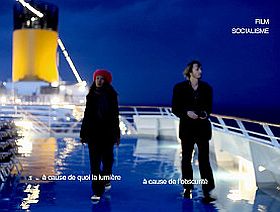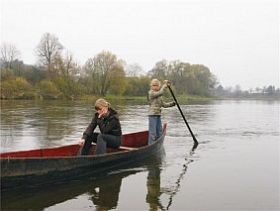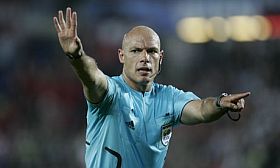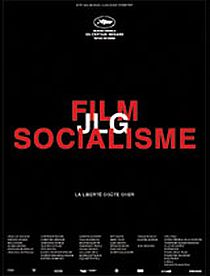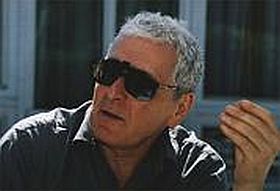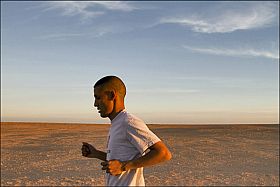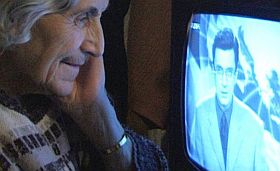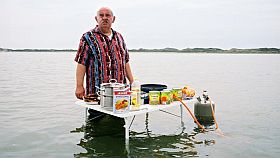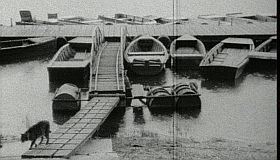While Cannes is still waiting for Godard, we had the great pleasure in Paris to spend the evening of June 18th in his company after a special screening of Film Socialisme in le Cinéma des Cinéastes near Place Clichy. The evening was organized by Mediapart, an important Internet news site founded in 2008 by Edwy Plenel (journalist and former managing editor of Le Monde), who hosted the event.
Film Socialisme (Vega Film, 102 min.), with the subtitle La liberté coûte cher (Freedom comes at a high price), continues in the line of collages of video, documentary archive, text, graphics, music and dialogue that Godard has been making since the late eighties, this time at the lengths of a feature film. It’s political, it’s poetic and radically experimental.
The film is “a symphony in three movements”, a triptych composed of the following three ‘tableaux’:
Des choses comme ça… (Things like that): Set on a cruise ship in the Mediterranean, different personages, including Patti Smith, the philosopher Alain Badiou and an undefined war criminal, strolls in and out of the kitsch decadence onboard the boat. Underneath lies a story of some ‘lost’ gold from the Spanish civil war and the destiny of Europe.
Notre Europe (Our Europe): A garage somewhere in rural France run by a family with two kids and a white lama. The children revolt and hold their parents to an explanation of the concepts of freedom, equality and fraternity, all filmed by a frantic television-crew.
Nos humanités (Our humanities): A visit to six legendary sites: Egypt, Palestine, Odessa, Hellas (“Hell as”), Naples and Barcelona. The film ends with a beautiful sequence borrowed from a film by Agnès Varda (herself present amongst the audience that evening), showing two trapeze artists on a beach. The final words are: No comment…
Godard uses several techniques that result in a multilayered and multidimensional “experience”, more like a painting. Godard mixes shots of different definitions from HD to low definition video (filmed by mobile phones), saturated colours blown up. There are beautiful images. The sound equally varies in space (coming from left, right, middle) and in intensity and quality. Godard compares it to painting with different tools: brushes, spatulas, knifes… And then there are the constant quotations, symbols, clichés, all adding to the density.
“We have freedom of expression, but we don’t have freedom of impression” Godard pointed out during the nearly two hours he spent with the audience after the film. He did not always answer the questions put to him by the audience, he was mocking, funny, but most of all generous. On the speculations whether Film Socialisme is his last film, Godard retorts that all his film have been ‘his last film’, at the time À bout de souffle was his last film too…
The video of the entire rendezvous with Godard can be viewed on the site of Mediapart in partnership with Arte.tv :
http://www.mediapart.fr/content/rencontre-publique-avec-jean-luc-godard
In May Mediapart did another interview with Godard filmed in ten episodes:
http://cinemasparagus.blogspot.com/2010/05/two-hour-interview-with-jean-luc-godard.html
The trailer (the entire film at high speed) can be seen on the official website of Film Socialisme: http://www.filmsocialisme.com/
Godard – impostor or genius? The critics are, as always, divided in two. For my part, I tend not to try to understand, but to just sit down and be “impressed”. It is a film that you have to see several times.
French press (quotes translated by me):
Les Inrocks, May 14th, 2010:
“A probing investigation of a fragile Europe on the brink of the abyss. The view is sinister, but the cinematographic gesture is brilliant and brisk”.
http://www.lesinrocks.com/cine/cinema-article/t/44989/date/2010-05-14/article/film-socialisme/
Le Monde, May 18th, 2010:
“Godard operates by constantly moving on to the next scene. The links are not obvious, but they allow you to bounce from one notion to another, until a logic is reached”.
http://www.lemonde.fr/festival-de-cannes/article/2010/05/18/film-socialisme-jean-luc-godard-decu-d-une-europe-qu-il-voudrait-revoir-heureuse_1353205_766360.html
Evene.fr, May 2010:
“… if Godard’s films have seemed unstructured or confused, it is simply that the Franco-Swiss film-maker has always refused to indulge in the hypnotic powers of the cinematographic language…
each of his films warns, in its own way, against the risk of manipulation that exists within any symbolic language. Therefore, his apparent hermetic style pertains to a scrupulous honesty… that has nothing to do with a banal mystification for idle intellectuals…
what is at stake is not so much to destabilize the audience as to grant them the mental space necessary to liberate their associations of ideas and feelings, in the experience of a cinema freed from common expectations and norms”.
http://www.evene.fr/cinema/actualite/jean-luc-godard-cannes-film-socialisme-nouvelle-vague-2711.php
Some reviews in English:
Jordan Mintzer in Variety May 17th, 2010:
“Grandpère terrible Jean-Luc Godard continues to flip the bird at cinematic convention in “Film Socialisme,” one of the 79-year-old auteur’s more challenging works, and one that carries his experiments in sound, image, narrative and montage all the way to the subtitles themselves.”
http://www.variety.com/review/VE1117942789.html?categoryid=31&cs=1&query=godard+film+socialisme
Robert Koehler on Filmjourney, May 22nd, 2010:
“…Film Socialisme is a work that can’t be properly assessed without identifying it, first, as militantly experimental… This all creates a fascinating reading-watching-listening experience that expands cinematic spectatorship far more than any 3D innovations, even if, like adjusting to iambic pentameter in the first minutes of a Shakespeare performance, your motor functions aren’t ready for it.”
http://www.filmjourney.org/2010/05/22/cannes-2010-day-godard/
Matt Noller, Slant magazine, May 18th 2010:
“I’m not going to actually review Film Socialism, as any type of critique I could make would be fundamentally worthless. To praise it would be to pretend to understand something I did not; to attack it would amount to no more than a superficial dismissal…
If you haven’t liked Godard’s contemporary films up to this point, Film Socialism seems unlikely to sway you. If you’re a fan, you will at least be familiar with his techniques here.”
(http://www.slantmagazine.com/house/2010/05/cannes-film-festival-2010-day-six/)
Should you be in the south of France this summer, a Godard retrospective runs at the Cinéma Utopia in connection with the Festival d’Avignon. Film Socialisme is screened from July 13-21:
http://www.cinemas-utopia.org/avignon/index.php?id=1022&mode=film
The dialogues of the film are published in book form: Film socialisme : Dialogues avec visages auteurs (97 pages, ed. P.O.L, May 2010)
Film Socialisme can still be viewed on the big screen in Paris.
